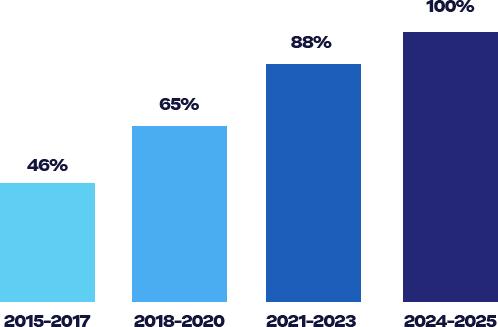Commitments and Policies
Know the commitments and policies of JBS.
Click here and get to know the Animal Welfare Policy in Brazil
Click here and learn about the Animal Welfare Global Policy
Click here and learn about the Responsible Use of Antibiotics Policy
Poultry
Livestock Technical CommitteeSeara is a member of the Livestock Technical Committee, from the quality certifier Global GAP, targeted at discussing trends, requirements and parameters on Animal Welfare worldwide.
Click Here to learn more about the initiative
Use of antibiotics
Seara has a detailed policy regarding the use of antibiotics. The use of medicines, vaccines and other substances not authorized by Seara is strictly prohibited, and the use of products that are not supplied by the technical assistance team is prohibited.
The responsible use of medicines and vaccines is one of the requirements listed in the Partnership Agreement, described in the Technical Guidance documents and Batch Monitoring Sheets, in addition to being reemphasized during all training sessions given by the technical team.
Pork
Collective gestation
In 2015, Seara embraced the commitment to make the transition from individual to collective gestation in 100% of pig production.
New projects or expansions are now being built according to this standard and, in addition, the company has supported its integrated producers in complying with this agreement, so that its entire chain can progressively adapt to the collective gestation system by 2025.
Novos projetos ou ampliações já são construídos de acordo com esse padrão e, além disso, a companhia tem apoiado seus fornecedores integrados no cumprimento deste acordo, de maneira que toda sua cadeia esteja adaptada ao sistema de gestação coletiva, progressivamente, até 2025.
A empresa tem trabalhado junto aos produtores para auxiliar no processo de migração do modelo. Até final de 2020, a Companhia contou com 56% de fêmeas em gestação coletiva. Importante ressaltar que, apesar de o percentual de atendimento ao compromisso ter diminuído em comparação a 2019, o número de matrizes em gestação coletiva aumentou de forma significativa em comparação ao ano anterior. O que causou a diminuição do percentual foi a contratação de novos produtores que passaram a fazer parte do sistema de integração, e que, em sua grande maioria, não estavam adequados ao sistema de gestação coletiva.
Evolution proposed to achieve the goal

